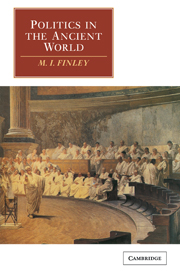Summary
In an oft repeated story Plutarch tells how, on one occasion in Athens while the voting was under way for an ostracism, an illiterate rustic approached a man and asked him to inscribe his potsherd (ostrakon) for him with the name Aristides. The man asked what harm Aristides had done him, and received the reply, ‘None whatever. I don't even know the man, but I am fed up with hearing him called “The Just” everywhere.’ Whereupon Aristides, for the man was he of course, duly entered his own name as requested (Aristides 7.6). An edifying tale, but my interest is in the willingness of historians to accept it as true and to draw from it wide-ranging conclusions about Aristides, about ostracism, and about Athenian democracy. Some had doubts about the image of Athenian political leaders as noble gentlemen who would not sully themselves with such low forms of behaviour as canvassing peasants and shopkeepers (only good political leaders, I need hardly add, not demagogues like Cleon). The sceptics have now scored an unexpected triumph. Excavations since the last war have uncovered, chiefly in the potters' quarter, more than eleven thousand ostraca with names inscribed on them. Most were obviously dumped in quantity following the completion of one or another ostracism. However, one batch of 190 found on the west slope of the Acropolis all bore the name of Themistocles, written in a small number of hands, clearly prepared beforehand for distribution among potential voters but in the end not used.
- Type
- Chapter
- Information
- Politics in the Ancient World , pp. 50 - 69Publisher: Cambridge University PressPrint publication year: 1983

